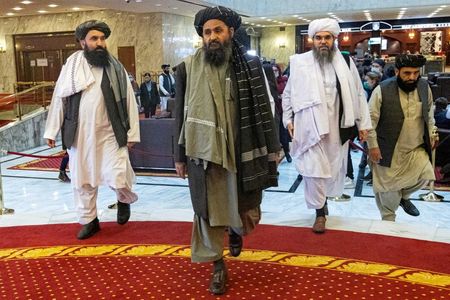
Analysis: Taliban choices in new cabinet could hamper recognition by West

By Rupam Jain and Alasdair Pal
(Reuters) – Afghanistan’s new rulers have rewarded Taliban veterans and hardliners with plum posts in the cabinet despite promising an inclusive government, but the choices could pose obstacles in the country getting Western recognition and aid.
At least three members named in what was described as an acting cabinet on Tuesday were among the Taliban Five, long-term detainees at the U.S. military prison in Guantanamo Bay who were freed in 2014 in exchange for an American soldier in Taliban custody.
The interior ministry went to Sirajuddin Haqqani, head of the Haqqani Network, who is wanted by the United States on terrorism charges and carries a bounty of up to $10 million.
His uncle, with a bounty of $5 million, is the minister for refugees and repatriation.
The 33-strong cabinet was dominated by Pashtun men, mostly battle-hardened veterans of the two-decade war against the U.S.-backed government.
There were no women and just three members from minorities, although these included the powerful positions of deputy prime minister, held by the Uzbek Abdul Salam Hanafi, and army chief, held by the Tajik Qari Faseeh udin.
“The way they have set about constituting a government sends the wrong signal,” said Rohan Gunaratna, professor of security studies at Singapore’s Nanyang Technological University, adding that the choices made it extremely difficult for the international community to recognise the new government.
“Afghanistan will not achieve a seat in the U.N.,” he said.
Foreign countries greeted the makeup of the new government in Afghanistan with caution and dismay https://www.reuters.com/world/asia-pacific/world-wary-taliban-government-afghans-urge-action-rights-economy-2021-09-08.
The European Union said it was ready to continue with emergency aid to Afghanistan, but will keep a close eye on the new Taliban government.
Afghanistan faces the collapse of basic services and food and other aid is about to run out, the United Nations said on Tuesday.
THE HAQQANIS
The three “Taliban Five” members in the cabinet were Head of Intelligence Abdul Haq Wasiq, Borders and Tribal Affairs Minister Noorullah Noori and Culture Minister Khairullah Khairkhwa.
The rising stature of the Haqqanis, whose fighters were at the forefront when the Taliban captured Kabul last month, was also a matter of concern, some analysts said.
The Haqqani network is described as a terrorist organisation by the United States, which has also said it receives support from neighbouring Pakistan, especially its ISI spy agency. Islamabad has denied the accusations.
However, some analysts noted that ISI chief Lt. Gen. Faiz Hameed visited Kabul at the weekend, just ahead of the announcement of the cabinet.
“The elevation of Sirajuddin (Haqqani) to Interior Minister and his uncle Khalil to a ministry reflects the fact that finance and protection from the ISI have leveraged the Haqqani Network into a powerful position at the heart of the new administration,” said Michael Semple, an Afghanistan expert at Queen’s University in Belfast.
The choice of Mullah Hasan Akhund as prime minister came as a surprise.
Although not known as a hardliner, he was favoured over Mullah Abdul Ghani Baradar, the head of the Taliban’s political office and the public face of its negotiations with the United States and other governments.
Baradar is deputy prime minister, but Michael Kugelman, deputy director of the Asia programme at the Woodrow Wilson Center in Washington, said: “We can perhaps read this move as a successful effort by hardline Taliban factions to sideline Baradar, who is a relative moderate within the Taliban.”
The other power centre in the Taliban, said Asfandyar Mir, an analyst at the United States Institute of Peace, was with old-timers from the Kandahar region in southern Afghanistan who draw their clout from their proximity to Mullah Omar, the late founder of the movement.
“What happens is in terms of inter-tribal dynamics, what region you’re from, how long you’ve been around and what’s your association with Mullah Omar,” Mir said.
“A lot of those factors continue to be more important than the developments of recent months, or years,” he said, referring to the moderates.

















POST COMMENTS (0)